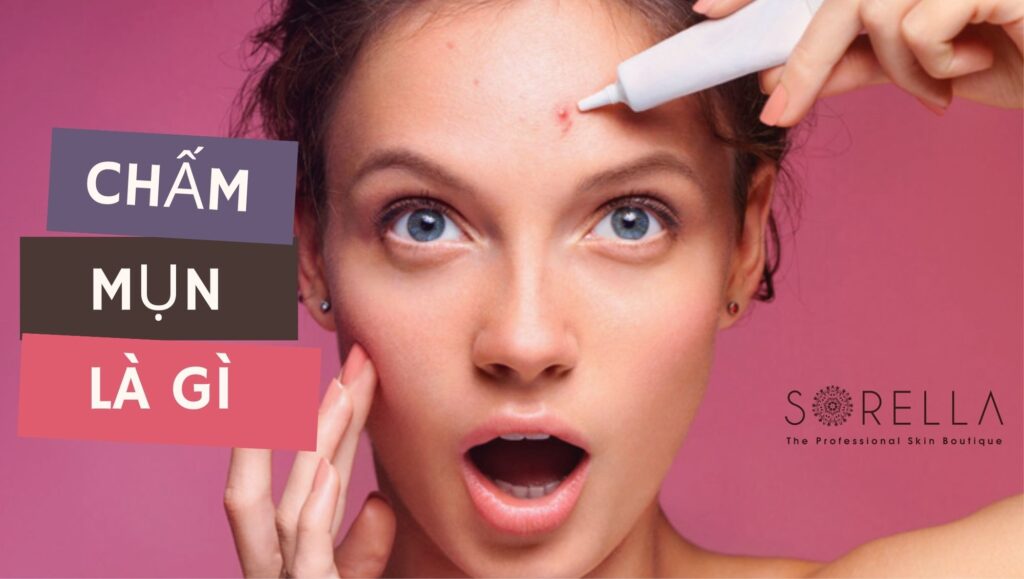Chăm sóc da điều trị mụn
Acne: diagnosis and 4 methods to treatment
Acne treatments function by either decreasing oil production and puffiness or treating bacterial infection. Most prescription acne medications do not produce benefits for four to eight weeks. It may take months or years for your acne to clear up entirely.
Treatment
If you’ve tried over-the-counter (nonprescription) acne treatments for a few weeks and they haven’t worked, consult your doctor about prescription-strength drugs. A dermatologist can assist you with the following methods:
- Keep your acne under control
- Prevent scarring and other skin damage
- Make scars less noticeable
Acne treatments function by either decreasing oil production and puffiness or treating bacterial infection. Most prescription acne medications do not produce benefits for four to eight weeks. It may take months or years for your acne to clear up entirely.
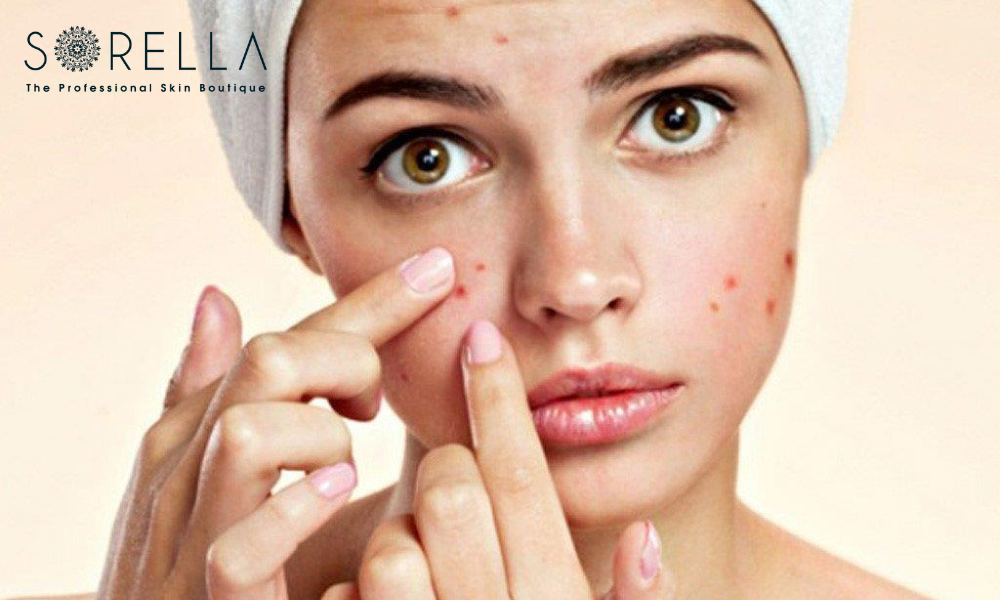
Your age determines the treatment program recommended by your doctor, the kind and severity of your acne, and your willingness to commit. For example, for several weeks, you may need to wash and apply treatments to the afflicted area twice a day. Topical therapies and pharmaceuticals taken orally (oral medication) are frequently used together. Because of the danger of adverse effects, treatment choices for pregnant women are restricted.
Discuss the risks and advantages of any drugs or other therapies you are considering with your doctor. Also, until your skin recovers, schedule follow-up consultations with your doctor every three to six months.
Medication for the skin
The following are the most often prescribed topical acne medications:
Retinoids and retinoid-like drugs
Retinoic acid or tretinoin-containing medications are frequently beneficial for mild acne. They are available as creams, gels, and lotions. Tretinoin (Avita, Retin-A, and others), adapalene (Differin), and tazarotene are a few examples (Tazorac, Avage, others). This drug is applied in the evening, three times a week at first, then daily as your skin adjusts. It keeps hair follicles from becoming clogged. Tretinoin should not be used in conjunction with benzoyl peroxide.
Topical retinoids make your skin more sensitive to the sun. They can also cause dry skin and redness, particularly in those with dark skin. Adapalene may be the most tolerable.
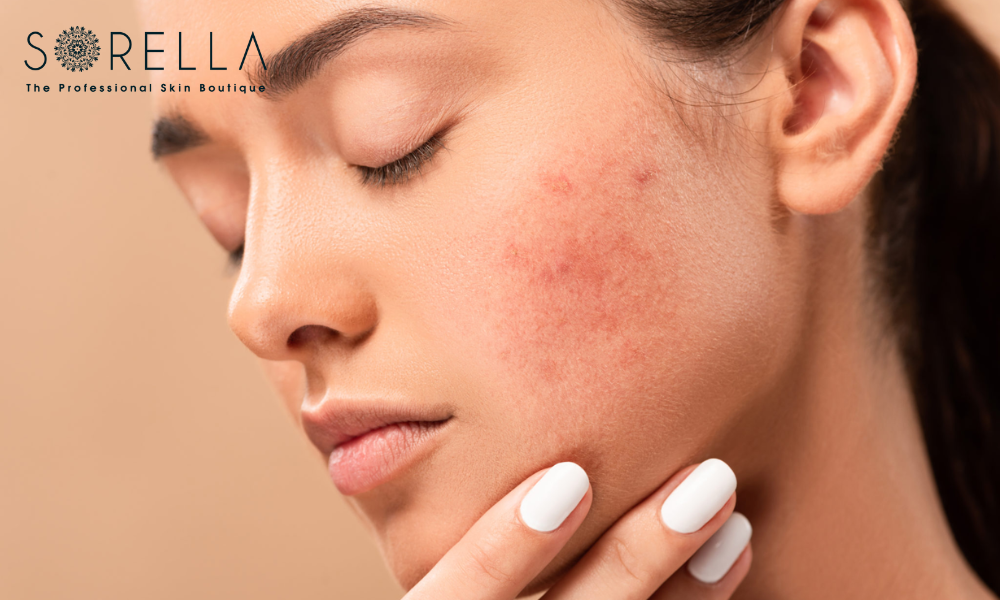
Antibiotics
They reduce redness and irritation by destroying extra skin germs. For the first several months, you may use both a retinoid and an antibiotic in the morning and the retinoid in the evening. Antibiotics are frequently used with benzoyl peroxide to prevent the possibility of antibiotic resistance.
Clindamycin with benzoyl peroxide (Benzaclin, Duac, and others) and erythromycin with benzoyl peroxide are two examples (Benzamycin). Topical antibiotics alone are not advised.
Salicylic acid and azelaic acid
Azelaic acid is an acid that occurs naturally in yeast. It is antimicrobial. When taken twice a day, a 20% azelaic acid cream or gel appears to be as effective as many traditional acne treatments. During pregnancy and when breastfeeding, prescription azelaic acid (Azelex, Finacea) is an alternative. It can also be used to treat discoloration caused by some forms of acne. Skin redness and slight skin irritation are possible side effects.
Salicylic acid, which is available in both wash-off and leave-on forms, may help prevent clogged hair follicles. There have been few studies that prove its usefulness. Skin darkening and slight skin irritation are possible side effects.
Dapsone
Dapsone (Aczone) 5% gel, used twice daily, is suggested for inflammatory acne, particularly in women. Redness and dryness are among the side effects.
The evidence for utilizing zinc, sulfur, nicotinamide, resorcinol, sulfacetamide sodium, or aluminum chloride as topical acne treatments is weak.
Oral medications
Antibiotics
Oral antibiotics may be required to decrease bacteria in moderate to severe acne. A tetracycline (minocycline, doxycycline) or a macrolide is usually the first option for treating acne (erythromycin, azithromycin). Macrolides may be a choice for those who cannot take tetracyclines, such as pregnant women and children under the age of eight.
To minimize antibiotic resistance, oral antibiotics should be administered for the least amount of time feasible. They should also be used with other medications, such as benzoyl peroxide, to lessen the possibility of antibiotic resistance.
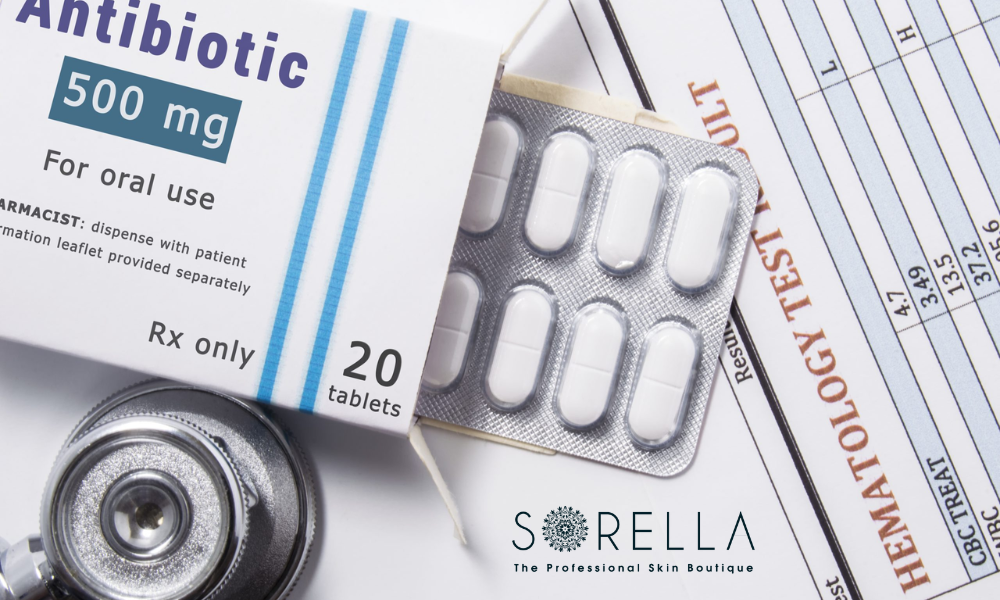
Antibiotics used to treat acne seldom cause severe negative effects. Some medications do enhance your skin’s sensitivity to sunlight.
Oral contraceptives in combination
The FDA has authorized four combination oral contraceptives for acne treatment in women who also want to use them for contraception. These are progestin and estrogen-containing products (Ortho Tri-Cyclen 21, Yaz, others). While you may not experience the benefits of this treatment for several months, combining it with other acne treatments for the first few weeks may be beneficial.
Weight gain, breast discomfort, and nausea are common adverse effects of combination oral contraceptives. These medications have also been linked to an increased risk of cardiovascular disease, breast cancer, and cervical cancer.
Anti-androgen medications
If oral antibiotics aren’t working, the medication spironolactone (Aldactone) may be explored for women and adolescent girls. It works by preventing androgen hormones from acting on the oil-producing glands. Breast soreness and painful menstruation are possible adverse effects.
Isotretinoin
Isotretinoin (Amnesteem, Claravis, and other brands) is a vitamin A derivative. It may be recommended for those who have moderate to severe acne that have not responded to prior therapies.
Inflammatory bowel disease, depression, and serious birth abnormalities are all possible adverse effects of oral isotretinoin. Everyone who receives isotretinoin must take part in an FDA-approved risk management program. They’ll also need to see their doctors frequently to watch for adverse effects.
Therapies
Some people may benefit from the following therapy, either by itself or in conjunction with drugs.
Therapy using light
A variety of light-based treatments have been tested with varying degrees of effectiveness. Most will need many trips to your doctor’s office. Further research is needed to establish the best technique, light source, and dosage.
Peeling agent
This method involves applying a chemical solution, such as salicylic acid, glycolic acid, or retinoic acid, repeatedly. This is a minor acne treatment. It may enhance the look of the skin, but the effect is temporary, and repeat treatments are typically required.
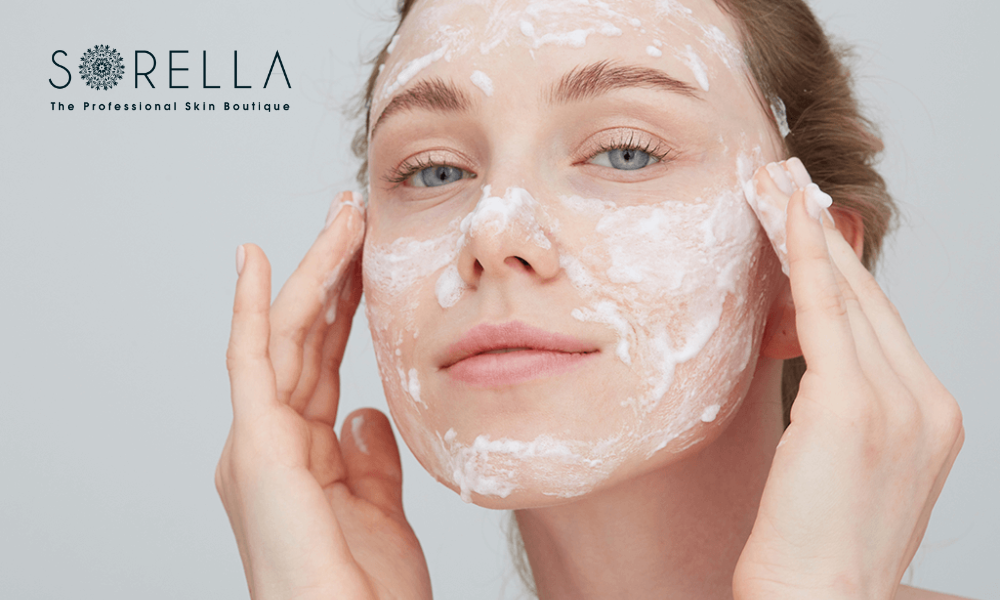
Extraction and drainage
If topical treatments haven’t cleaned up whiteheads and blackheads (comedones) or cysts, your doctor may use specific instruments to carefully remove them. This method enhances the look of your skin briefly, however, it may cause scarring.
Injection of steroids
Steroid medication can be injected into nodular and cystic lesions to treat them. This treatment has resulted in significant improvement and pain reduction. Skin thinning and discoloration in the treated region are possible side effects.
Treating children
The majority of acne medication trials have included patients aged 12 and above. Acne is becoming more common in younger children. The number of topical treatments allowed for use in children has been increased by the FDA. According to the American Academy of Dermatology, topical benzoyl peroxide, adapalene, and tretinoin are effective in preadolescent children and do not raise the risk of adverse effects.
Consider seeing a pediatric dermatologist if your kid develops acne. Inquire about pharmaceuticals that should not be given to children, acceptable dosages, drug interactions, adverse effects, and how therapy may influence a child’s growth and development.
Alternative medicine
Several alternative and integrative medicine techniques for acne treatment may be beneficial:
The oil of tea tree
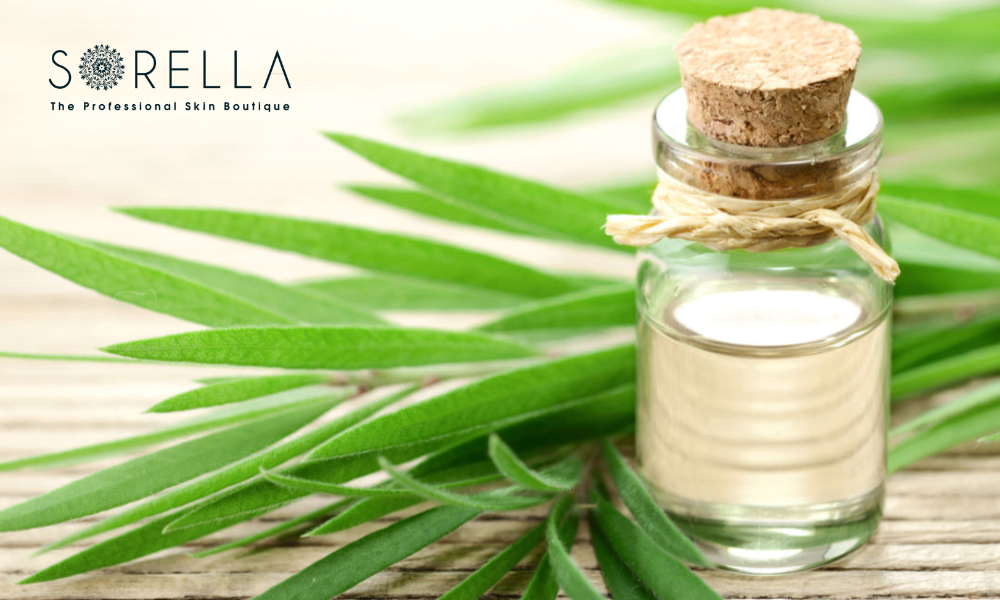
Gels with at least 5% tea tree oil may be equally effective as lotions with 5% benzoyl peroxide, while tea tree oil may function more slowly. Little itching, burning, redness, and dryness are possible side effects, making it an unsuitable choice for persons with rosacea.
The yeast used in brewing
When administered orally, a strain of brewer’s yeast known as Hansen CBS seems to help reduce acne. That might result in gas (flatulence).
Further study is needed to determine the efficacy and long-term safety of these and other integrative techniques, such as biofeedback and ayurvedic medicines. Before attempting any treatment, discuss the benefits and drawbacks with your doctor.
Home cures and lifestyle
Nonprescription medications, proper basic skin care, and other self-care approaches can help you avoid or control mild or moderate acne:
Use a mild cleaner to clean troublesome areas. Wash your face twice a day with warm water and light soap or a gentle cleanser (Cetaphil, Vanicream, etc.). Furthermore, use caution while shaving affected skin.
Some products, such as face washes, astringents, and masks, should be avoided. They irritate the skin, which can aggravate acne. Excessive cleaning and scrubbing can also irritate the skin.
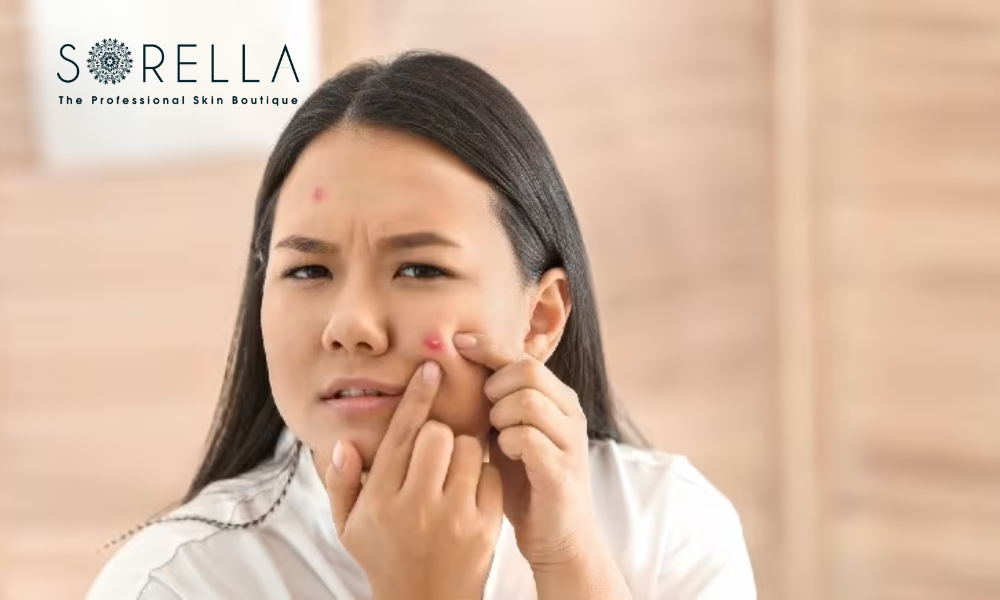
To dry excess oil and stimulate peeling, use over-the-counter acne treatments. Search for products with the active chemicals benzoyl peroxide and adapalene. You might also try salicylic acid, glycolic acid, or alpha hydroxy acids-containing products. It may take many weeks to utilize a product before you see any difference.
Creams are gentler on the skin than gels or ointments. Nonprescription acne medicines may have early adverse effects including redness, dryness, and scaling, which usually go away during the first month.
Avoid irritants
Irritants should be avoided Acne can be exacerbated by oily or greasy cosmetics, sunscreens, hairstyling products, or acne concealers. Use water-based or noncomedogenic products instead, which are less prone to trigger acne.
Sun protection is essential for your skin
For some people, the sun aggravates the discoloration that might stay after the acne has healed. Also, certain acne medicines make you more prone to sunburn. See your doctor to discover if your drug falls under this category. If so, avoid the sun as much as possible. Use a non-comedogenic (noncomedogenic) moisturizer with sunscreen regularly.
Avoid rubbing or applying pressure on your skin
Phones, helmets, tight collars or straps, and backpacks should be avoided if you have acne-prone skin.
Touching or picking at acne-prone regions is not recommended. This might result in additional acne, infection, or scars.
After the heavy activity, take a shower. Breakouts can be caused by oil and perspiration on your skin.
Breakouts can be caused by oil and perspiration on your skin.
Coping and assistance
Acne and acne scars can lead to anxiety and have an impact on your social life and self-image. Talking with your family, a support group, or a counselor might sometimes be beneficial.
Acne can be aggravated by stress. Get enough sleep and practice relaxation techniques to help you cope with stress.
Getting ready for your appointment
Make an appointment with your doctor if your acne isn’t responding to self-care or over-the-counter remedies. Early and successful acne treatment decreases the danger of scarring and long-term damage to your self-esteem. Following an initial examination, your doctor may recommend you to a dermatologist who specializes in the diagnosis and treatment of skin disorders (dermatologist).
Here is some information to assist you in preparing for your appointment:
List your key medical information, such as other conditions you’re dealing with and any prescription or over-the-counter products you’re using, including vitamins and supplements.
Include important personal information, such as substantial pressures or recent life changes.
Make a list of questions to ask your doctor. Making a list of questions ahead of time can allow you to make the most of your time with your doctor.
Here are the articles that Sorella shares about beauty knowledge you can refer to:
Acne: 13 Home Treatments for Pimples to Help You Get Rid of Acne
Lip Fillers: What to be expected about beauty trends predicted in 2023
Experts predict 6 skincare trends to watch for in 2023


 中文 (中国)
中文 (中国) 한국어
한국어 English
English


